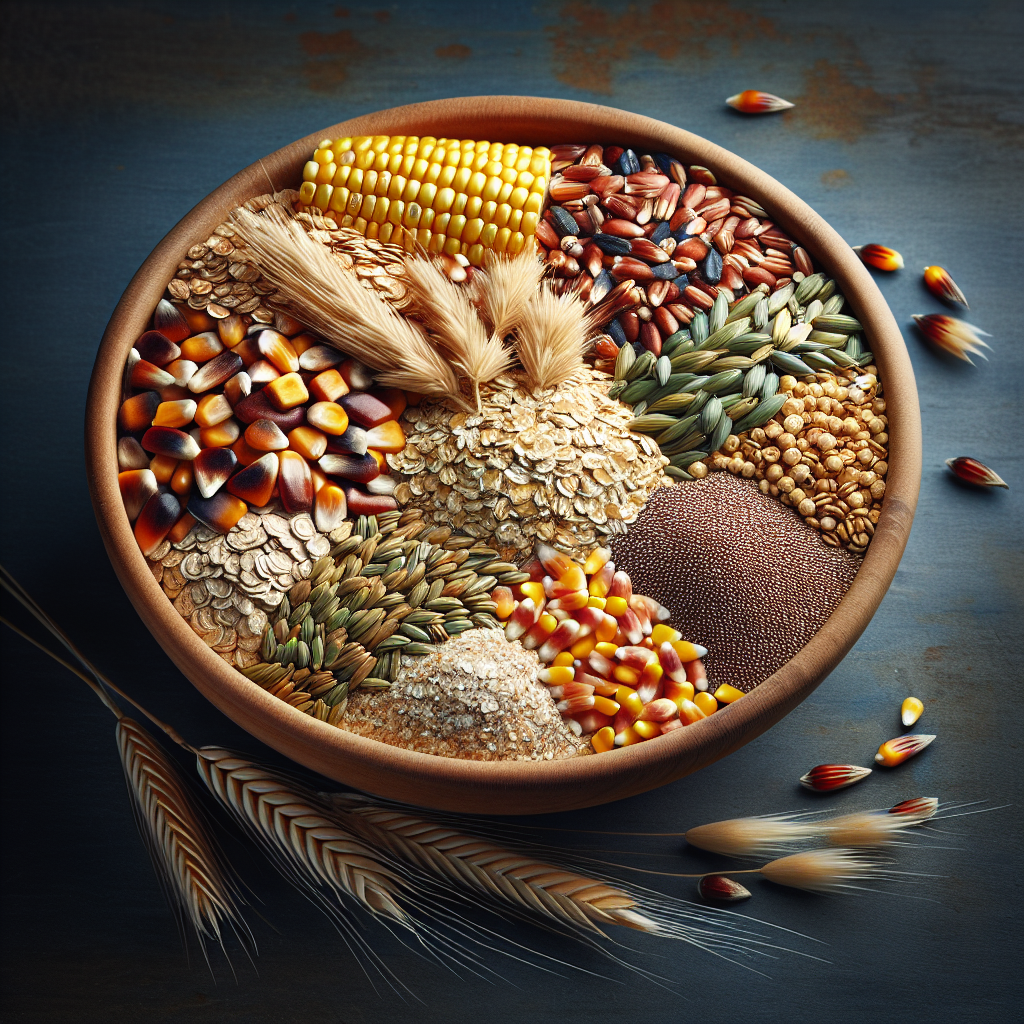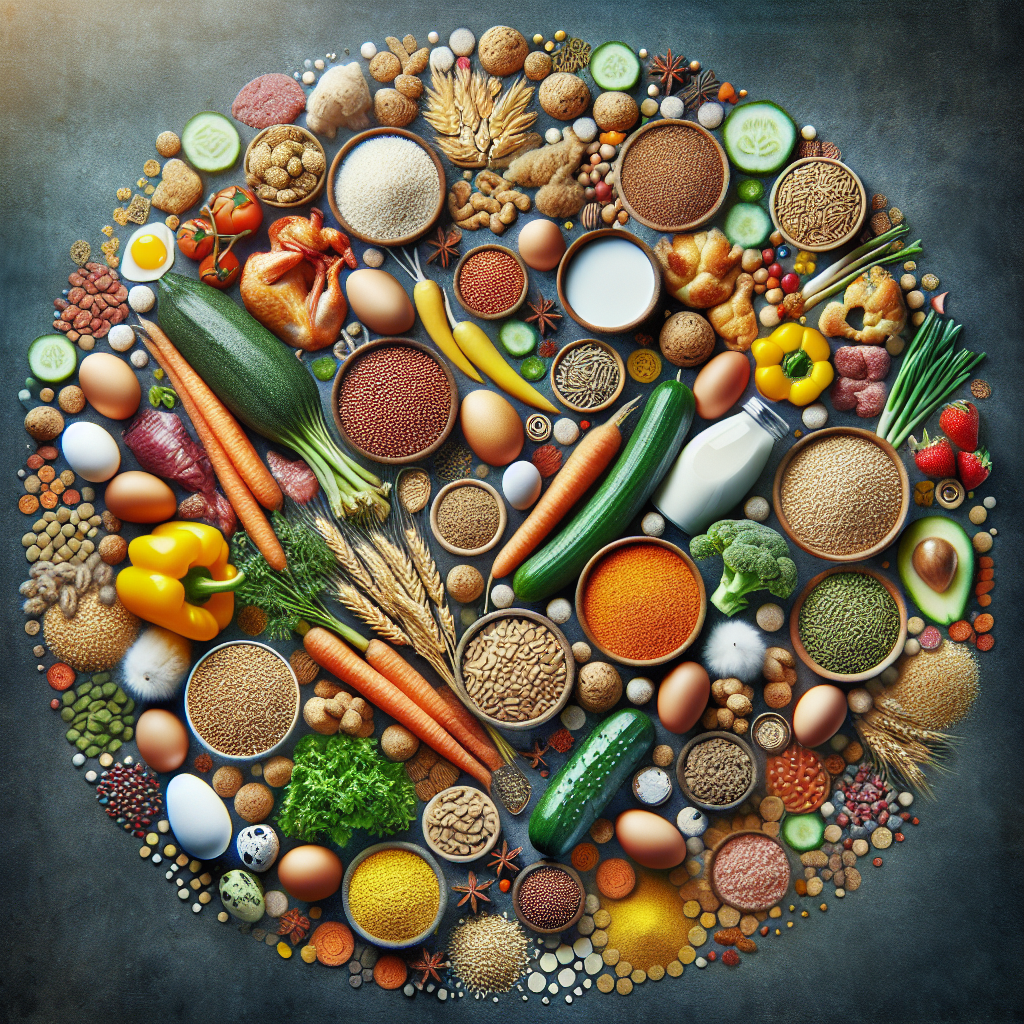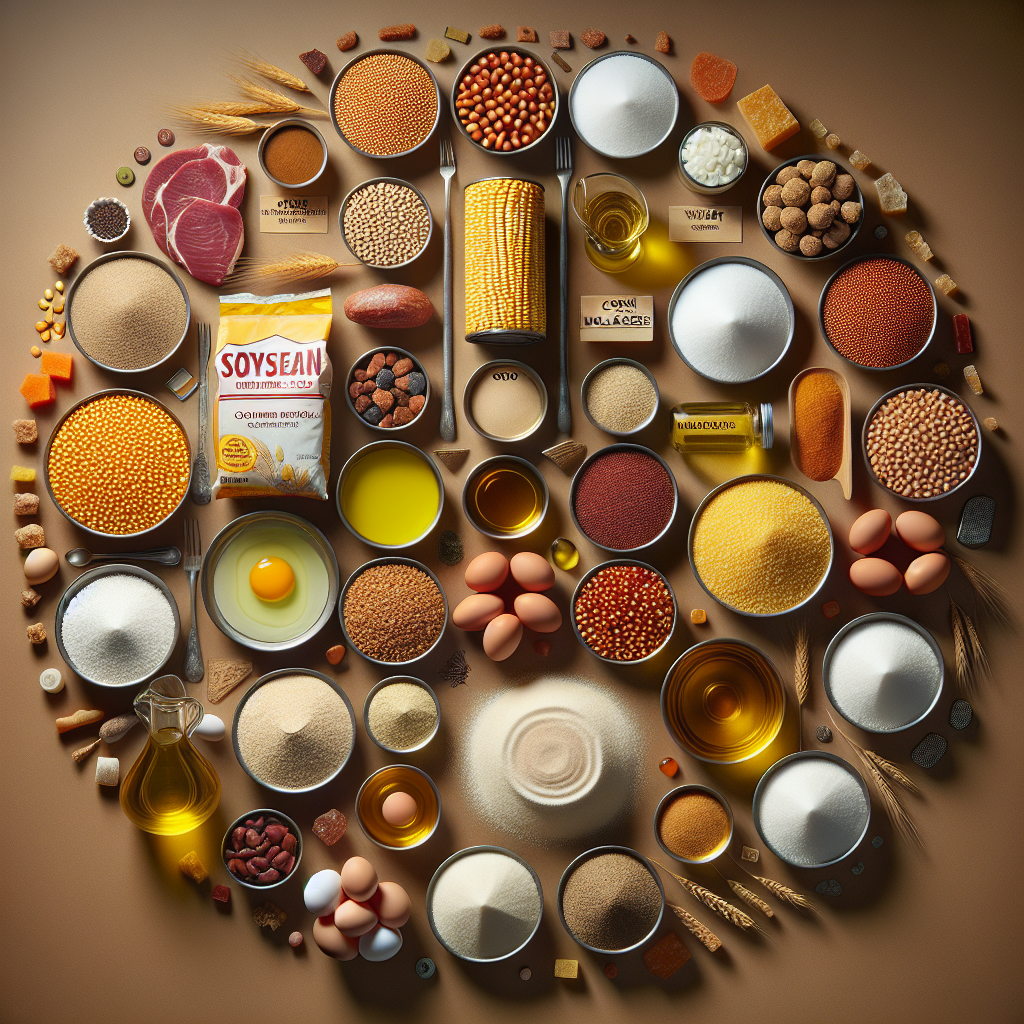Interested in creating your own chicken feed at home? Look no further! In this article, we will explore the fascinating world of sourcing and mixing your own chicken feed ingredients. Whether you’re a seasoned poultry enthusiast or just beginning your chicken-raising journey, we will provide you with all the information you need to ensure a healthy and balanced diet for your feathered friends. Discover the benefits of crafting your own feed, learn about essential ingredients, and gain valuable tips on how to properly mix them. Get ready to embark on a rewarding adventure of DIY chicken feed production right in the comfort of your own home!
Understanding the Nutritional Needs of Chickens
The importance of a balanced diet for chickens
When it comes to keeping your chickens healthy and productive, providing them with a balanced diet is of utmost importance. Just like humans, chickens require a variety of essential nutrients to thrive. A well-balanced diet not only supports their overall health but also ensures optimal egg production and growth.
Essential nutrients for chickens
Chickens have specific nutritional requirements that must be met through their diet. These essential nutrients include proteins, carbohydrates, fats, vitamins, minerals, and water. Proteins are crucial for muscle development and egg production, while carbohydrates provide energy for daily activities. Fats, on the other hand, serve as a concentrated source of energy and help maintain healthy feathers and skin. Additionally, vitamins and minerals play vital roles in supporting a chicken’s immune system, bone strength, and overall well-being.
Different feed options for chickens
Feeding chickens can be as simple as purchasing commercial feeds or as involved as sourcing and mixing your own feed at home. Commercial feeds often come in various forms, such as pellets, crumbles, or mash, and are formulated to meet the nutritional needs of chickens. However, if you prefer more control over your chicken’s diet and want to tailor it to their specific needs, sourcing and mixing your own feed is a great option. This allows you to choose high-quality ingredients and avoid any potential additives or toxins present in commercial feeds.
Sourcing Ingredients for Chicken Feed
Choosing high-quality grains for chicken feed
Grains form the base of most chicken feeds and provide a good source of carbohydrates and energy. When sourcing grains for your chicken feed, it is essential to choose high-quality options that are free from mold, toxins, or pests. Common grains used in chicken feed include corn, wheat, barley, oats, and millet. Always ensure that the grains you select are fresh and have not been treated with any harmful chemicals.
Locally available options for chicken feed ingredients
While purchasing grains from a local feed store is a convenient option, you may also consider sourcing ingredients directly from local farmers or agricultural cooperatives. This not only supports local businesses but also allows you to have a better understanding of the sourcing practices and quality of the ingredients. Additionally, locally available options may include alternative grains or crops that are suitable for chicken feed, such as sorghum or sunflower seeds.
Considering organic and non-GMO options
If you prefer to provide your chickens with organic or non-GMO feed, it is important to source ingredients that meet these criteria. Look for certified organic grains or ingredients that have not been genetically modified. Organic and non-GMO options may be more expensive or harder to find, but they can provide peace of mind knowing that your chickens are consuming feed that is free from synthetic pesticides or genetically engineered ingredients.
Supplementing Chicken Feed with Protein Sources
The role of protein in a chicken’s diet
Protein is an essential component of a chicken’s diet, as it is involved in various physiological functions and plays a crucial role in egg production, feather growth, and overall health. Chickens need a sufficient amount of high-quality protein to support muscle development, eggshell formation, and the production of essential enzymes and hormones.
Different protein sources to consider
When supplementing chicken feed with protein, there are several options to consider. One common protein source is soybean meal, which is readily available and provides an excellent amino acid profile. Other plant-based protein sources include peas, lentils, and sunflower seeds. Additionally, animal-based protein sources such as fish meal, meat meal, or dried insects can also be included in the feed.
Sourcing and preparing protein-rich ingredients at home
You can source protein-rich ingredients for your chickens from various sources. For plant-based protein sources, consider purchasing them from local farmers, feed stores, or online suppliers. If you’re inclined towards animal-based protein sources, consider sourcing from reputable suppliers or even exploring the option of raising insects for your chickens. When using animal-based protein sources, it is essential to follow proper cooking or processing methods to ensure safety and eliminate any potential pathogens.
Incorporating Vitamins and Minerals into Chicken Feed
Understanding the importance of vitamins and minerals for chicken health
Vitamins and minerals are essential for maintaining the overall health and well-being of chickens. Vitamins help regulate various physiological processes, support the immune system, and ensure proper growth and development. Minerals, on the other hand, are involved in bone formation, enzyme function, and maintaining electrolyte balance.
Common sources of vitamins and minerals for chicken feed
To incorporate vitamins and minerals into chicken feed, you can source them from various natural ingredients. For example, leafy greens like spinach and kale are rich in vitamin A, while citrus fruits provide vitamin C. Additionally, poultry-friendly herbs like oregano and thyme can offer antioxidant properties. Mineral-rich options include crushed oyster shells for calcium, seaweed for iodine, and various types of legumes for iron and zinc.
Creating a well-rounded vitamin and mineral mix
To ensure that your chickens receive a well-rounded mix of vitamins and minerals, it is important to offer a diverse range of ingredients that provide these nutrients. Consider rotating greens and herbs in their diet, providing a balanced mix of minerals, and supplementing with poultry-specific vitamin supplements if necessary. By doing so, you can help maintain optimal health and support the overall vitality of your chickens.
Balancing Macronutrients in Chicken Feed
The importance of balancing carbohydrates, fats, and proteins
In addition to vitamins and minerals, it is crucial to balance the macronutrients – carbohydrates, fats, and proteins – in your chicken’s diet. Each macronutrient provides a different role in supporting their health and productivity. Balancing them ensures that your birds are receiving the necessary energy and nutrients without any excess or deficiencies.
Different carbohydrate options for chicken feed
Carbohydrates serve as the primary energy source for chickens, providing the necessary fuel for daily activities. Common carbohydrate options for chicken feed include grains like corn, wheat, or barley, as well as tubers like sweet potatoes or pumpkins. It is important to select carbohydrate sources that are easily digestible and provide a slow release of energy to sustain your chickens throughout the day.
Choosing healthy fat sources for chickens
While fats are a concentrated source of energy, they are also crucial for maintaining healthy feathers, skin, and overall health. Healthy fat sources for chickens include vegetable oils, such as soybean or sunflower oil, which provide essential fatty acids. Additionally, including small amounts of high-quality animal fats, like fish oil or tallow, can also be beneficial. It is important to avoid excessive fat in the diet, as it can lead to obesity or other health issues.
Avoiding Harmful Additives and Toxins in Chicken Feed
Identifying harmful additives and toxins in commercial feeds
Commercial feeds often contain various additives and ingredients that may not be suitable or safe for your chickens. These can include artificial colors, preservatives, antibiotics, or growth hormones. It is important to carefully read the ingredient labels and avoid feeds that contain these potentially harmful additives or toxins. Opting for natural and organic options can help minimize the risks associated with such additives.
Opting for organic and natural ingredients
Choosing organic and natural ingredients for your homemade chicken feed can ensure that your chickens are receiving wholesome and nourishing meals. Organic ingredients are grown without the use of synthetic pesticides or fertilizers, and are free from genetically modified organisms (GMOs). Natural ingredients, on the other hand, are minimally processed and do not contain any artificial additives or preservatives. By opting for these types of ingredients, you can have peace of mind knowing that you are providing your chickens with the best possible feed.
Managing potential risks and contaminants
When sourcing and mixing your own chicken feed, it is crucial to manage potential risks and contaminants. Proper storage of ingredients, maintaining cleanliness, and avoiding cross-contamination are essential practices to minimize any potential health risks. Regularly inspecting your ingredients for signs of spoilage or pests can also ensure that your feed is of the highest quality and safe for your chickens to consume.
Grinding and Mixing Chicken Feed at Home
Equipment and tools for grinding and mixing
To prepare homemade chicken feed, you will need certain equipment and tools. A grain mill or grinder is essential for grinding grains and other ingredients to the desired consistency. A mixing container or bucket, along with a mixing paddle or a drill attachment, will help you thoroughly combine all the ingredients. Additionally, having a scale or measuring cups and spoons can ensure accurate measurements of the ingredients.
Calculating the right ratio of ingredients
Creating a balanced feed requires calculating the right ratio of ingredients based on their nutritional content and the specific needs of your chickens. Researching different feed formulas or consulting with poultry nutritionists can provide valuable guidance in determining the appropriate ratios. It is important to note that feed requirements may vary depending on the age, breed, and purpose of your chickens.
Maintaining hygiene and cleanliness
Maintaining proper hygiene and cleanliness is crucial during the grinding and mixing process. Clean and sanitize all equipment before use to prevent any potential bacteria or pathogens from contaminating the feed. Additionally, store ingredients in a clean and dry area to minimize any risks of spoilage or infestation. Regularly inspecting and cleaning your equipment and storage areas ensures that your homemade chicken feed is safe and wholesome for your flock.
Storing and Preserving Homemade Chicken Feed
Proper storage techniques for homemade feed
Proper storage of homemade chicken feed is essential to maintain its freshness and nutritional value. Store the feed in a cool, dry, and well-ventilated area to prevent moisture buildup or exposure to sunlight. Consider using airtight containers, such as food-grade buckets with lids, to protect the feed from pests and rodents. Avoid storing excessive amounts of feed for extended periods to ensure that it remains fresh and palatable.
Preventing spoilage and contamination
To prevent spoilage and contamination of homemade chicken feed, it is important to be mindful of its shelf life. Always use the oldest feed first and avoid mixing fresh and old feed together. Regularly inspect the feed for signs of mold, pests, or any unusual odors. If any issues are detected, discard the affected feed immediately to avoid any potential health risks for your flock.
Using feed in a timely manner
To ensure optimum quality and nutrient content, it is crucial to use homemade chicken feed in a timely manner. Avoid purchasing or preparing excessive amounts of feed that may go unused for extended periods. Ideally, aim to prepare small batches of feed that can be consumed within a reasonable timeframe, typically one to two months. By doing so, you can ensure that your chickens are always receiving the freshest and most nutritious feed.
Transitioning Chickens to Homemade Feed
Gradually introducing homemade feed to chickens
When transitioning your chickens from commercial to homemade feed, it is important to do so gradually. Abruptly changing their diet can lead to digestive upset and stress. Start by mixing a small portion of homemade feed with their regular commercial feed and gradually increase the percentage of homemade feed over the course of a few weeks. Pay close attention to your chickens’ behavior and overall health throughout the transition period.
Monitoring chicken health and behavior during transition
Transitioning chickens to a new feed requires careful monitoring of their health and behavior. Observe their appetite, energy levels, and egg production to ensure they are adjusting well to the homemade feed. Any significant changes or concerns should be addressed promptly. If necessary, consult a poultry veterinarian or nutritionist for guidance and assistance during the transition period.
Making adjustments to the feed mix
Each flock of chickens is unique, and their nutritional needs may vary. While homemade feed recipes provide a great starting point, it may be necessary to make adjustments to the feed mix to better suit your chickens’ individual requirements. Monitor their growth, weight, and overall health to gauge whether any modifications are needed. Adding or reducing specific ingredients, altering the ratios, or seeking professional advice can help optimize your chickens’ feed and support their well-being.
Conclusion
Sourcing and mixing your own chicken feed at home can be a rewarding and beneficial practice for both you and your chickens. By understanding the nutritional needs of chickens and carefully selecting high-quality ingredients, you can provide them with a well-balanced and nutritious diet. Incorporating proteins, vitamins, minerals, carbohydrates, and fats in the right proportions ensures optimal health, egg production, and growth. By avoiding harmful additives and toxins, practicing proper storage and hygiene, and gradually transitioning chickens to homemade feed, you can support their overall well-being and enjoy the satisfaction of providing them with the best possible nutrition.




